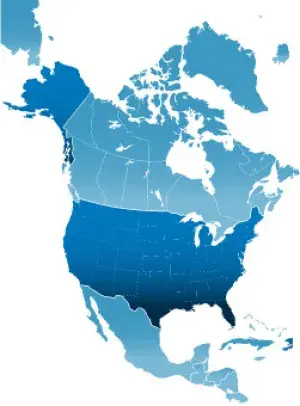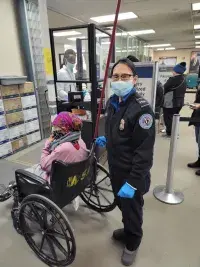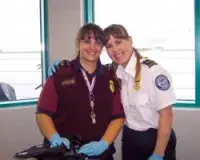
Editor’s note: TSA celebrates National Native American Heritage Month to recognize the achievements and contributions of American Indian and Alaska Native champions who have inspired others to achieve success.
Alaska is so massive and located so far north of the lower 48 states that most maps place it in the bottom left hand corner just to fit it on a single page. But insert it back where it belongs and it’s 663,330 square miles of mostly unspoiled wilderness, where roads are scarce and taking to the air might be the only way to get to point B.
Alaska natives Michelle Thomassen and Rose Richardson help secure two of the 19 federalized airports vital to Alaska’s way of life.
“Our job in this remote location is a bit challenging due to the geographical nature and the 1,099-mile distance between our hub, Ted Stevens Anchorage International Airport (ANC), and our station,” said Wrangell Airport’s (WGR) TSA Supervisory Officer Michelle Thomassen. “If you were able to drive, it would take 36 hours, but a four-hour flight is the only way to travel because no roads connect the two cities.”
Bethel Airport (BET) TSA Officer Rose Richardson knows the terrain well. Her BET career bookends work at ANC, Kodiak Airport and Seattle-Tacoma International Airport.
Standard-bearers of native language and customs
Richardson, who taught English as a second language in Anchorage schools before onboarding with TSA in 2003, learned her family’s native Yup’ik language as a student at the University of Alaska Fairbanks.
“I feel it’s a privilege to be at a jobsite where a lot of the travelers are Yup’ik,” said Richardson. “The fact that I can interact with them in Yup’ik makes it a more positive experience, but especially for our elders as it seems to make it less stressful if they need extra help.”
The Yup’ik clan is found in western, southwestern and southcentral Alaska and the Russian Far East. In her study of the language, Richardson learned of the similarities of Yup’ik, Chinese and Japanese.
“That fact alone reinforced the migration theory across the Bearing Land Bridge to Alaska in the past,” said Richardson. “We must keep native languages alive, especially for future generations.”
When asked what her native Alaskan heritage meant to her, Richardson answered instantly and unequivocally: “It’s everything I am. It lives in me.”
Thomassen agrees. “This part of my life is so important to me because this is truly who we are and where we came from. This is the heart of our values, morals and ethics.”
A couple generations ago, having native blood was considered a mark of shame by some.
“During that time, a lot of our traditions began to fade away,” lamented Thomassen, who comes from the Tlingit tribe and the Taalkweidi clan. “I am extremely happy to see that our native language is now being taught in the schools and the traditions are back in full force.”
Still strongly connected to her family legacy of fishing, Thomassen spends her annual leave on the family’s 105-year-old boat, fishing for Halibut. Generations of her family have earned a living from the Alaskan waters and Thomassen feels privileged to pass along that culture to her children.
Before 9/11, Thomassen worked at a travel agency, supporting the bustling Alaskan tourist industry.
“It was that day I knew I wanted to do my part to help protect our beautiful country and the people that live here,” recalled Thomassen. “It’s been 18 years and I’m still here and just as passionate about the mission as I was back then.”
What I do matters - Rose Richardson
We make sure travelers are safe and that the screening process for them is positive, efficient, and not too stressful. I have learned through the years that courtesy is like a universal symbol, just as English is a bridge language. Any traveler from anywhere recognizes and appreciates good manners. I feel that matters especially as TSA has begun to gain recognition compared to how much it was underappreciated when it first introduced new security procedures for travelers.
What I do matters – Michelle Thomassen
TSA supervisory officers truly are the most senior officers at our station, on an island in the middle of nowhere. We are the eyes and ears for our leadership. It is extremely important to communicate effectively in order to keep our team on track and keep everyone updated on the newest and most important information.
By Karen Robicheaux, Strategic Communications & Public Affairs


